- Home
- Cary Fagan
The Old World and Other Stories Page 6
The Old World and Other Stories Read online
Page 6
BOY We kids won’t get that. Well, does she know where you’re taking her?
DEATH Yes and no. It’s considered one of the great mysteries of existence, what happens after. But really, it’s not so hard to figure out, in a general sort of way.
BOY Now you’ve really lost us.
Death chuckles and pats Boy on the head.
DEATH But I haven’t come for Miss Maple yet. She’s going to hang on, feeling worse and worse, for weeks. It’s cruel, but there’s nothing I can do about it.
BOY Then you’ve come for nothing. You must be pretty sore about that.
DEATH No, not for nothing. I’ve come for someone.
BOY Me?
DEATH Well, not really you. The person who controls your strings. The person who took me from a life playing Shakespeare for this. Who sweet-talked me into being his partner and then treated me like a lowly assistant. Who made me play all the ridiculous secondary parts. The person who has been in control of every decision, every boring show, every penny, and who is finally going to get what he deserves.
BOY That isn’t funny. You wouldn’t do anything that you’d later regret. I know you. I know you all too well. And these pathetic threats — aah!
(Sounds behind the curtain: scuffling, groans, smacks, cries.)
Both Death and Boy begin to swing wildly back and forth, their feet not touching the ground. They become tangled up in each other, a leg stuck out here, an arm there. They collapse in a heap as their control sticks fall on top of them.
The children scream.
The curtain jerks closed.
GREENLEES!
Greenlees, that motherfucker! That backstabbing son of a bitch. Greenlees is dead.
I’ve spent so long resenting Greenlees — hating and blaming him, waiting for the day that I can show how little he means to me — that finding out about his death has unmoored me. That’s the only word for it. I’m floating without a destination.
He’s been dead for a month. How is it that I didn’t hear about it sooner? I left town long ago, of course, had to pack my bags and take what few dollars I still had and leave with my tail between my legs. Leave with my own mother ashamed of me, my father refusing to acknowledge me, my brothers cursing me, my girl having become Greenlees’s girl. That was twenty-two years ago. And in that time my mother died, my father went too, and my brothers all moved away.
But even though I left I kept up a mail subscription to the town newspaper, where every small event was noted, where Greenlees’s photograph appeared at the ribbon-cutting for his new factory, at the annual Farm and Home Exhibition where he stood smiling before a pyramid of Greenlees Boot Preserver, at the company picnic surrounded by happy children watching a puppet show. I cut the articles and photographs out and pasted them in an album. I needed to know everything. Otherwise how could I know what I had to surpass? And how could I judge, now, that my success was indeed bigger than his, my happiness greater? I would study the photograph of his face with its small eyes and thin moustache. I would use a magnifying glass to better see the wife who was usually just behind him, smiling shyly. Over the years she grew heavier (they both did), her hair lightened, and thick glasses appeared on her face.
How had she been deceived by Greenlees? Perhaps at first she might have been taken in by his easy charm and glib salesman’s tongue, his wit and flattery. But later, as she got to know him, to see him as he really was, how could she love him and share his bed and bring his progeny into the world? Because there in the photographs, beside Greenlees putting a ribbon on a cow or shaking some politician’s hand, were the children. First one, then another, until there were five in all, each a miniature Greenlees minus the moustache. They had been suckled by the woman who had once been my girl. Well, the whole picture made me sick.
Even if I can’t prove it in a court of law (as I tried to do), I will assert until my dying day that Greenlees stole his boot preserver recipe from me. That I myself learned it from a drunk Australian is no matter, for the exact proportions of beeswax to petroleum to herbal scents, and so on, were my own. Without resources, I had naively asked Greenlees to become my partner. And what did he do? He squeezed me out and then, when I vociferously complained, he turned the town’s opinion against me. And so I left, or was hounded out, and for two years I scratched and scrambled to keep body and soul together, to save a few dollars. When I had enough I began to make my own boot preserver, boiling the ingredients on the burner in my rented room, finding an even better combination. I used a cheap kitchen spatula to fill the empty tins with the cooling paste. Then on weekends I went to the local market, to the dog track, and I stood with my product laid out on a soapbox. To everyone who passed by I extolled my boot preserver, how it would keep leather supple, protected, and waterproof. How it would restore the original lustre. Was it good for ladies’ shoes? Of course! Could it be used on bags, purses, coats, saddles? Yes, it could!
Of course Greenlees didn’t have to sell his product himself anymore. He had distributors, a sales force, advertising. The image of a smiling, mustachioed Greenlees holding up a sparkling tin of Greenlees Boot Preserver loomed from billboards across the country. As I stood behind my soapbox, people would say to me, “Is it as good as Greenlees?”
And yet I sold my tins — for ten cents less than Greenlees’s. One or two at first, then more. People came back. I became exhausted from cooking the stuff all night and then going to my place of labour in the morning, but never did I let up. In eight months I quit my job and rented a small warehouse space for a large double-boiler and a table for packaging. I had labels — yellow instead of green — printed with my own smiling face. One day a week I drove an old truck from shop to shop, restocking shelves. A hardware store with twelve branches placed a large order. Within two years my boot preserver could be found right beside Greenlees’s. My billboards went up beside his. It was reported to me that shopkeepers now asked, “Which boot preserver do you want, Greenlees or Morgan?”
I became wealthy. I built a house in the French style, not unlike Greenlees’s house (I had seen a photograph in the town newspaper). I did not marry, unable to let go of my feelings for the slip of a girl who had once been mine. Of course I dated beautiful women (the prerogative of a wealthy man) and was often photographed with them for the newspapers. Did Greenlees see these photographs? I certainly hoped so.
The marketplace, it turned out, had room for two boot preservers, and both Greenlees and Morgan thrived. But that wasn’t enough for me, so I had my salesmen spread a rumour that Greenlees Boot Preserver was made with fat that came from the carcasses of stolen dogs. It was such a delectably awful idea that the rumour spread quickly and was even printed in the newspapers. Greenlees dismissed the rumour so casually that he offended some people and made others more suspicious. Before long a postcard began to circulate from hand to hand, a photograph of a forlorn-looking mutt with a sign around its neck: Please don’t make me into Greenlees. I was sorry only that I couldn’t take credit for it!
I knew that sales of Greenlees Boot Preserver began to fall because our own rose rapidly. Within three months sales went up almost sixty percent. Shops began taking Greenlees off the shelves. Billboards were defaced. A headline in the town newspaper announced that the Greenlees factory was laying off half its employees. Then another revealed the Greenlees family had put its house up for sale and was moving into a much more modest home. A few months later the company declared bankruptcy and shuttered its doors. Greenlees Boot Preserver was no more.
Now I owned the market. Greenlees had been an insect, a speck, and I had ground him under my heel. Now at last it was time to confront him face to face, to stand at his door and say, “Greenlees, you conniver and thief, you have finally gotten what you deserve.” I got into my automobile and had my driver take me the 120 miles back to the town where I was born. I walked the streets, awash with poignant
memories. Here I took my girl for a soda, there we went to the movies and afterwards had our first kiss. As I was standing there the wind blew an old newspaper against my legs. I picked it up and read the obituary for Greenlees.
How had I missed it? How had I not known that a month earlier Greenlees had dropped dead in his underwear? I had become so busy with the growth of my company that I had neglected to read the town newspaper. It was as if Greenlees had died deliberately, just to rob me of my moment!
I walked to the cemetery. It felt cold and desolate. I passed headstones and read the names of people I’d known in childhood — Gormley, Noonen, Cunningham. And there was Greenlees. I stood by the grave and imagined the man himself, wide faced, mustachioed, already starting to moulder in the ground.
Stumbling over the uneven terrain, I hurried back to the automobile. The driver headed to the other side of town, where the Greenlees had moved. I instructed him to stop in front of the house. It was small and almost shabby. The roof needed new shingles and the paint on the door was peeling. I did not move from the back seat. Surely this was the moment my life had been building to, not the humiliation of Greenlees after all but my own salvation. I took a deep breath, got out of the car, and walked the short path to the front door.
I knocked.
When there was no answer I knocked again. I heard footsteps and then slowly the door opened. And there she stood. My girl. Her youth was gone but her face still wore the same frank and honest expression.
I saw the uncertainty in her eyes, for I too had changed much. Then came the dawning recognition. Yes, I thought, yes it’s me, your first love. She looked at me for a long moment, as if thinking of all the years gone by.
And then she closed the door.
I SPARE MYSELF NOTHING
Dearest Isabelle,
I am sorry that it has taken so long for me to write, but a series of circumstances — tragic, sorry, ridiculous, and finally triumphant — have delayed this letter all these months.
First I must ask, how are you? And how are your ma and pa, your five sisters? Will it be a good harvest? The weather here is so different that I cannot imagine how it is there. I hope your beloved Dora is well. Even now I can see you on your stool, dress hitched up past the top of your boots as you milk her. Ah, if only I could really see that, Isabelle!
I arrived here by train on the second of March. Although forewarned, I still found myself overwhelmed as I emerged from the busy station. The sea of humanity! The carts and wagons and bicycles and motorcars! The men striding purposely or standing shiftless, the women in their plumed hats coming out of shops, the efficient office girls hurrying along, the buildings rising four and five storeys — it was like a dream of the future. And that is when I looked down to see that my bags were gone. Yes, I was robbed within the first two minutes of my arrival.
All I had left was the suit I wore and three dollars in my pocket, as well as the address of where I could stay for cheap. I walked through the crowds (it felt like swimming) and got lost over and over but at last reached the street. It was crowded with carts full of goods and people haggling as if in some exotic bazaar. The man who answered the door took a dollar from me and then showed me to a room on the fourth floor that was already inhabited by three people. I was assigned the remaining corner, along with a mattress that smelled of mould and a soapbox to keep my things in.
Immediately I set out for my cousin’s shoe store. As you know, my father had already wired Herman a considerable sum of money for him to take me on as a junior partner and salesman. But when I got there, the store was dark. I tried the door to find it locked. A notice pasted on the window stated that the business was closed permanently. My father’s money was gone! A terrible feeling came over me. Tired, hungry, dizzy from the constant movement around me, I felt as helpless as a child. And it was then, Isabelle, that my shame began.
You have always said that I am naturally gullible, and that all someone has to do is look into my face to know it. Well, that’s just what happened. While I was standing there a woman stopped to ask why I was in such obvious distress. She was very well dressed and, I admit, also very pretty. In a moment I was blurting out my sorry tale. “You poor man,” she said, touching my wrist with her gloved hand. Perhaps it was my condition, but I felt a thrill. She insisted that we get into a carriage at her expense. We rode uptown and soon were passing impressive brownstone houses facing a green park. She paid the driver and led me to a door, letting us in and introducing me to her papa, who sat in the elegant drawing room with a newspaper. The man rose and held out his hand, and when he heard my story he expressed shock and outrage but not surprise. He said that decent, honest men like myself were as scarce as hen’s teeth in the city, and even implied that I was just the sort of fellow he was hoping his daughter would meet. I blushed with gratitude and pleasure. (You see, Isabelle, I spare myself nothing.)
The woman’s name was Charity. She removed her gloves and hat, letting her tresses fall. She told her papa that I needed a good job, something that paid well, and that he must take care of me for her sake. “Yes, I see that,” he said. “Do come with me, young man.” Naturally I wondered what sort of work he could offer without knowing any of my skills, whether it would be in an office or involve some kind of labouring, but I followed him through the house and down a set of stairs. We came to an odd door, covered in ornately engraved brass. He knocked — it seemed a special rhythm — and the door was opened, by whom I could not see for it took a few moments for my eyes to adjust to the dim candlelight. There was the heady fragrance of roses. What I was slowly able to make out, Isabelle, I can hardly tell you. I saw bodies — naked bodies writhing together. Men and women, men and men, women and women, in couples and larger groups, like many-limbed, many-sexed animals. In the midst of one of these groupings I saw a young figure, hardly older than a child, male or female I couldn’t tell, down on its knees before another. This youthful person turned up to me, the languid eyes found mine, and a most beautiful smile lit up the face. In that moment I knew the grin of the devil.
“Go,” said Charity’s papa, giving me a gentle push. “Give pleasure to whomever desires it. Take pleasure for yourself. In two hours’ time I will pay you fifty dollars.”
Fifty dollars! Whoever heard of such a sum for two hours’ work? And yet I was not — I swear — tempted. Raising up my hand, I knocked the man down. Then I ran out the door and up the stairs. “A pity,” Charity said from her chair in the drawing room, sounding not disturbed in the least. I dashed out onto the street and kept going.
I cannot tell you the terrible, guilt-ridden night I spent on that mattress. While I had not participated in the debauchery, I had certainly been tempted by Charity herself — tempted away from my upbringing, my intentions, and worst of all, from you. All that I could do to comfort myself was conjure memories from home. I remembered one afternoon when you and I picnicked in the orchard and you read me a poem. The still, sad music of humanity.
In the morning I rose quickly, determined to redeem myself. I began to walk the streets and soon found a job in a cafeteria, not even as a waiter but a dishwasher. Yet I was glad to get it and have been working there ever since, nine hours a day, six days a week, and saving as much money as I can.
Oh Isabelle, do you still have the photograph that I gave to you before my leaving, the one of me in my best clothes, gazing out into some gloriously imagined future? I ask you to take it in your hand and look at it now. I long ago sold the suit I wore that day, but I still have the tie pin you gave me as a parting gift. I imagine what is in your eyes as you look at my likeness: irony, suspicion, even revulsion — but also, I hope, compassion. You must know that I work only for the time when we will be united once more. I am still your man, if you will have me. I still see you skipping between the trees of the orchard, still hear the ripe pears falling to the ground. Do not despair; know that I have walked through the fire and come out the other side
! And as for that woman, Charity (if that was even her name), I hardly think of her anymore.
I remain,
Your Lucas
CIVILIZATION
“So what do you do?” the guy asked, sipping the head off his beer. We were standing at the bar. What a fucking question. Did I look like I was a scientist, maybe, or one of those male ballet dancers? I was wearing a goddamn suit and I was a half block from the stock exchange.
I drank down my whiskey and asked for another. “Grease monkey,” I said.
“Ha ha, that’s a good one. I got you pegged as one of those stockbrokers.”
“Bingo.”
“Truth is, I’ve dabbled a bit myself. Just penny stocks, mind you. But I got a good feel for it.”
Did he now? Then he was better than me. Because right now I was knocking back another drink to forget the fact that I’d made a bad gamble this afternoon and lost thirty-eight thousand dollars. A little error that my boss would discover in the morning.
“So you want to guess what I do?” he asked, putting his calloused hands around that glass of beer like it was a woman’s waist.
“Hmm. Let me see. You write the messages in greeting cards.”
“Nah. I make chairs.”
“Uh-huh.”
“Actually, it’s my father’s business. But I’m taking it over. Slowly. Learning the ropes, so to speak. I was in college for a while.”
“Found out they couldn’t teach you anything you didn’t already know?”
“Just didn’t take to it. Too much talk.”
“Go figure.”
“My father’ll be ready to retire in a couple of years. He started the business like thirty years ago. Pressback wooden chairs. Oak. We’ve got a few models but basically you’re talking a high-back model and a café chair.”

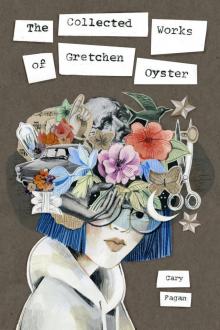 The Collected Works of Gretchen Oyster
The Collected Works of Gretchen Oyster Wolfie and Fly
Wolfie and Fly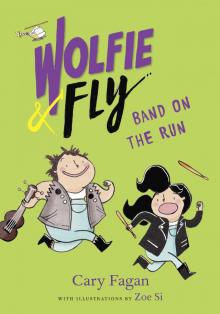 Band on the Run
Band on the Run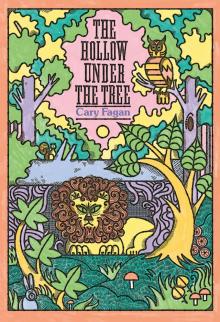 The Hollow under the Tree
The Hollow under the Tree Jacob Two-Two on the High Seas
Jacob Two-Two on the High Seas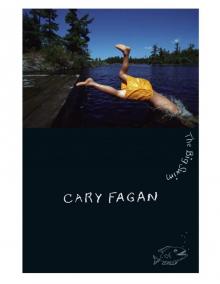 The Big Swim
The Big Swim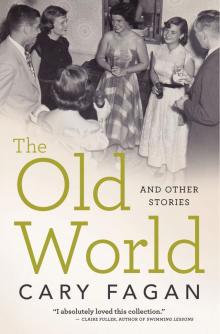 The Old World and Other Stories
The Old World and Other Stories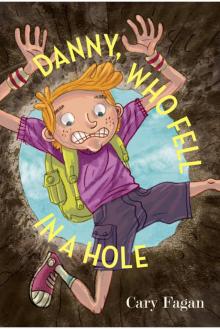 Danny, Who Fell in a Hole
Danny, Who Fell in a Hole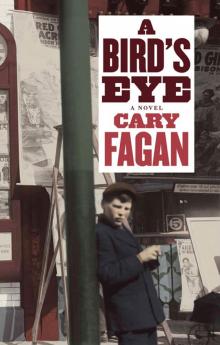 A Bird's Eye
A Bird's Eye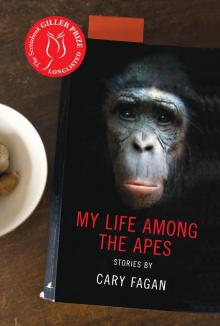 My Life Among the Apes
My Life Among the Apes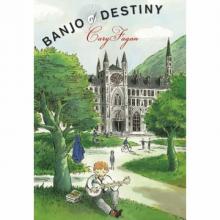 Banjo of Destiny
Banjo of Destiny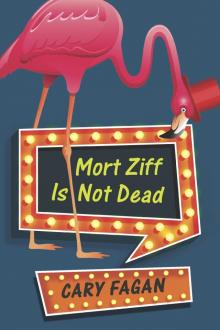 Mort Ziff Is Not Dead
Mort Ziff Is Not Dead